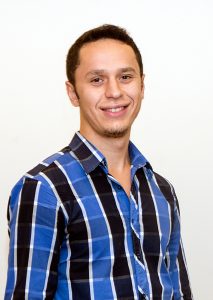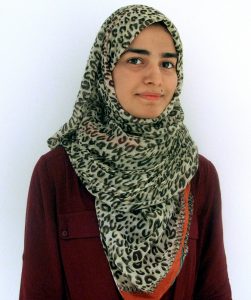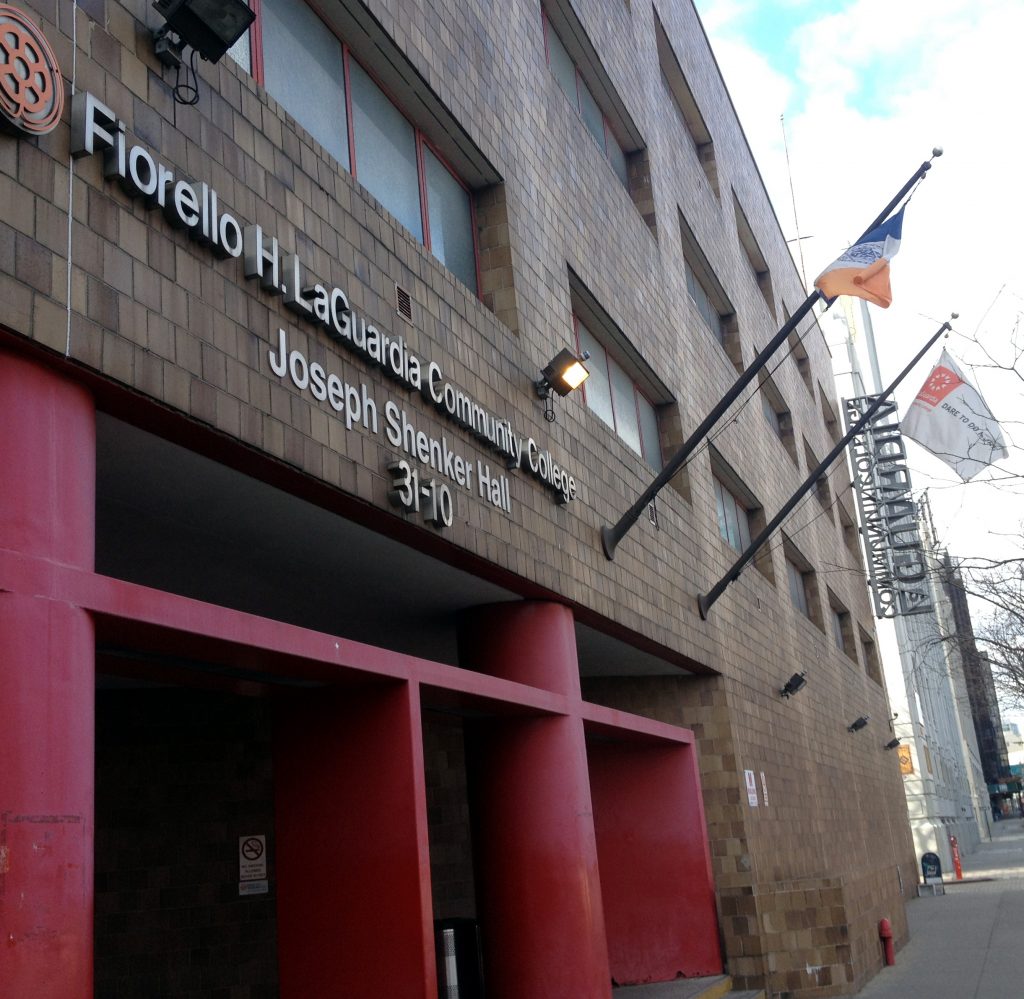With about 45 percent of its 48,000 students coming from other continents – 150 countries, in total – LaGuardia Community College in Long Island City, Queens, is truly unique in its diversity.
The campus is large, but mostly contained in a four-story building that takes up a square block, and is clean and modern looking. Inside, staff, students and visitors are respectful, and there’s a bustle of activity. With so many races, cultures and languages represented, one doesn’t even really notice the differences after immersion onto the campus, and instead takes on an attitude of wanting to learn from and truly understand how unique each and everyone is. Each individual has a unique story, we find out, and his or her culture is only a part of that story.
But with rhetoric that at times seems Islamophobic cycling on the national cable media channels and even in the Presidential race, I thought that it would be good to go to America’s most diverse community college to talk to Muslim students about their perspectives. Here are two stories:
Mahmut Eren Ozsar, age 22
 Unsatisfied with the academic opportunities his homeland had to offer, the independent Turkish native who goes by his middle name, Eren, moved to the U.S. to fulfill his educational goals.
Unsatisfied with the academic opportunities his homeland had to offer, the independent Turkish native who goes by his middle name, Eren, moved to the U.S. to fulfill his educational goals.
He entered the U.S. with a student visa in the Fall 2012 semester, first taking ESL courses at Queens College. He quickly picked up English – finishing what normally is a 28-month course of study in just eight months – and is currently very fluent in it. A roommate suggested he head over to try LCC for his for-credit study.
“I ended up going to LaGuardia, and didn’t at first realize how lucky I was to be here,” Eren said. “The professors area easy to talk to and help with papers; they show you your mistakes and are willing to give you a second chance. You get to learn from your mistakes.”
Currently, he is a writing and literature major at LaGuardia Community College. He has excelled in critical thinking and poetry courses, in particular.
“Community college is just not about the classes you take, but also the networking. I’ve met with people from various departments and then would get emails daily about internships and workshops in corporate fields,” Eren said.
On campus, he joined the President’s Society and was accepted into its Ambassador program. Meeting each Wednesday night, Ambassadors learn: Career Planning (interviewing, resume writing, networking with industry professionals); Communications and Comportment (public speaking, etiquette and dress); Cultural Appreciation (exposure to art, theater, music and dance), and Community Service and Leadership (supporting fellow students and serving as an “ambassador” of the College).
“Two-year colleges prepare you and give you the confidence and opportunity to meet people,” he said.
Because of his international status, Eren’s tuition is significantly higher than a state resident’s. He is also not eligible for traditional financial aid. To help pay for his education, he has received significant tuition support from the LaGuardia Community College Foundation. He received the Spring into Action Scholarship both last academic year and this year as well.
“The [Ambassador-related] events helped bring out the best in me,” he said. “They would help me build the confidence to work harder and study harder.”
He scored a 3.5 GPA recently, and has seen a steady improvement in his academic performance because of these programs. Now he’s thinking of someday attending law school. He would like to become an attorney “to help people secure and protect their rights.”
“If I had gone straight to a four-year college as an international student, just learning English, I’m not sure I would have made it.”
But study in Turkey was much less inspiring, and Eren had been just a typical student there. He has been reinvigorated academically here in the US. “I didn’t become interested in studying English until I came here. I hated studying it in Turkey. I didn’t take it seriously,” he said. “I love New York City – the culture – I feel at home and more involved now. This is a new start for me.”
He believes that perhaps students here take college education more seriously because it isn’t free, as it is in Turkey and other countries. “The challenge of paying tuition means that you have to take it seriously,” he said.
On Being Muslim
Eren has found friends in New York’s Turkish community. He also trail blazed a path for his brother, Burak, 19, to come to the US and also study at LaGuardia.
“As a Muslim in America I have multiple different feelings. I feel alone as a Muslim because there is not any powerful voice to represent Muslims nowadays,” he said.
As for the Islamophobia that seems to be represented by some national American media, he doesn’t see it at the local level. In his classroom discussions on such topics, Eren reports that his classmates – of Christian, Muslim and other faiths – are civil, open-minded and work to understand each other.
“It is about human beings. If I believe in Islam today but were to convert to Christianity tomorrow, that wouldn’t change my character,” he said. “I have seen all kinds of Muslim people. If you are a bad person, in the end, your religion isn’t going to help you much.”
But he does agree that the mainstream media can have an effect on how many people view his faith, focusing on extremists and using them to generalize a whole religion. “People have to do their own research.”
Becoming radicalized and a terrorist is “impossible,” if one is to truly follow Islam, he said. He had not encountered the word “jihad” until his studies here, in doing research for a term paper.
“I feel very sorry for Muslims and other people because of what some terrorist groups like ISIS have been doing,” he said. “Their misrepresentations of Islam and their barbarian way of killing innocent people gives a fear to the world and also attacks the Muslim community in the world by misrepresenting them.”
Eren believes that each person can lead by example: “I’m the kind of person who wants to give back; who wants to make this a better world, by being educated.”
Hafsa Tahir, age 21
 Hafsa was born in Pakistan and has lived in countries all over the world, including Indonesia, Malaysia and Thailand. She moved to the US with her father, mother and three siblings two and a half years ago, as her father now works for the Pakistani embassy.
Hafsa was born in Pakistan and has lived in countries all over the world, including Indonesia, Malaysia and Thailand. She moved to the US with her father, mother and three siblings two and a half years ago, as her father now works for the Pakistani embassy.
She is in LaGuardia’s international studies program with a concentration in public administration. She hopes to someday work in the United Nations.
“My experience here has been very great, and eye-opening,” Hafsa said. “Before I came here, I was very skeptical and afraid of coming to America. … I thought there would be bullying, but I’ve found a very diverse people here; they are accepting and fun-loving.”
She was accepted into LaGuardia’s Luce Heritage Language Scholars Program, which is dedicated to nurturing the inherent language abilities of first- and second-generation immigrants and positioning these students for careers that leverage such skills. Students who earn a Luce Heritage Language Scholarship receive full tuition coverage for two years and/or a monthly stipend. She also teaches new LCC students in the college’s ePortfolio program, helping them with study, career and life skills.
Hafsa wears a traditional head scarf and sometimes gets “weird” questions about her heritage, but they aren’t mean-spirited, just inquisitive. “They ask me if I wear it at home, as well,” she laughed.
But she knows that many people have pre-conceived notions before meeting her. “The media really impacts people’s ways of thinking and has a powerful impact on people’s reaction [to Muslims],” she said. “I hear negative media reports, and it even makes me feel scared. I feel guilty for no reason.”
But she finds that LaGuardia is a safe haven. “The college is a great environment. There is no judgment there.”
Hafsa is a part of LaGuardia’s Muslim Student Association. The larger MSA group also meets at other CUNY schools and hosts cultural events.
She said that non-Muslims may have misconceptions about what happens in mosques. “They are open, friendly environments. People go there five times a day for prayer. They are not political.”
She worries that the media may focus on an extreme element of people who claim to be Muslim, and characterizes the whole faith based on these extremists.
“They are a tiny minority of Islam and their actions are related to political intent and power and what is happening in Syria and Iraq,” she said.
Like Eren, Hafsa believes she can lead by example and dispel cultural generalizations.
“Because I cover myself with a scarf, people think I have a very different lifestyle than them … because of the way I look,” she said. “I have a job and deal with lots of people on a daily basis. People at first seem afraid to speak to me. I try to make them comfortable, and invite any odd questions.”
She said that people sometimes make false assumptions that her faith has harems, for example.
“My cover [scarf] is about modesty,” she said. “Muslim women follow a rule of chastity.”
If someone tries to talk of Muslim terrorism, “I tell them I am as unaware of those activities as you are. …
“If people are violent by nature, their interpretation of religion will be violent. It is a psychological issue, not a religious one. The Quran is clear, ‘If any one killed a person, it would be as if he killed the whole of mankind.’
“But one doesn’t have to be Muslim to be able to differentiate between right and wrong.”






Facebook Comments